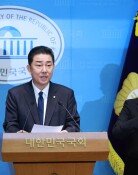Supplementary budget raises fiscal health fears
Supplementary budget raises fiscal health fears
Posted March. 29, 2013 04:53,
The Park Geun-hye administration on Thursday announced measures for expanding fiscal policy aimed at boosting the slowing economy. This was the first economic policy announced by the new president`s economic team led by Finance Minister Hyun Oh-seok. The government will push for a supplementary budget of more than 10 trillion won (9 billion U.S. dollars), spend more than 60 percent of the funds before July, and increase public spending on building infrastructure by 1 trillion won (900 million dollars). Most of the measures are aimed at reinvigorating the economy. The government is seeking a supplementary budget for the first time since 2009, when it had 28.4 trillion won (25.6 billion dollars) in extra budget, suggesting that the new economic team is taking the economic situation seriously.
The additional budget could cause controversy, however, as the National Fiscal Act allows supplementary funds only in certain cases such as negative economic growth for two consecutive quarters. When the government had an extra budget in 2009, the economy had shrunk by 4.6 percent in the fourth quarter of 2008. But the government must act aggressively considering that the economy has grown under 1 percent for seven straight quarters.
The most shocking aspect of the announcement of this years economic policy is the gloomy growth outlook. The government forecast 4-percent growth when it submitted a budget bill in September last year. Just six months later, the projection was nearly halved to 2.3 percent. As the governments new estimate is lower than those of other organizations such as the Bank of Korea (2.8 percent), the Korea Development Institute (3 percent) and LG Economic Research Institute (3.4 percent), suspicion has grown that the administration intentionally lowered its outlook to expedite approval of the supplementary budget bill approved by the National Assembly.
Alarm bells have rung on the country`s fiscal soundness. Tax revenue is expected to decrease by more than 6 trillion won (5.4 billion dollars) from what was projected in the original budget bill. The government plan to raise extra revenue by selling its stakes in Industrial Bank of Korea seems unlikely this year. Despite falling revenue, the government has to increase spending to boost the economy. More welfare budget is needed to implement President Parks campaign promises. The government failed to show specific measures Thursday to raise 135 trillion won (121.4 billion dollars) needed over the next five years to keep her pledges. When the government drew up its 2012-2016 mid-term fiscal plans, it aimed to maintain a balanced budget, which it failed to do so. Cho Won-dong, senior presidential secretary for economic affairs, admitted that lower tax revenue alone amounts to a deficit equivalent to 1 percent of GDP. At a time like this, the budget must be carefully controlled to prevent waste of money.
Economic stimulus is just first-aid for the economy, not a fundamental solution. Koreas growth rate plunged to 2 percent last year to match that of Japan, whose economy is five times larger. The plunge in Koreas growth potential is also serious. The government needs to reinvigorate the economy by easing regulations to encourage businesses to expand investment and support the service industry, just as it does for manufacturers. The government will announce a series of measures to boost the economy from next week, starting with the real estate market and investment encouragement actions to help small- and mid-size exporters and strengthen the service industry.



![‘건강 지킴이’ 당근, 효능 높이는 섭취법[정세연의 음식처방]](https://dimg.donga.com/c/138/175/90/1/wps/NEWS/IMAGE/2026/01/18/133181291.1.jpg)



